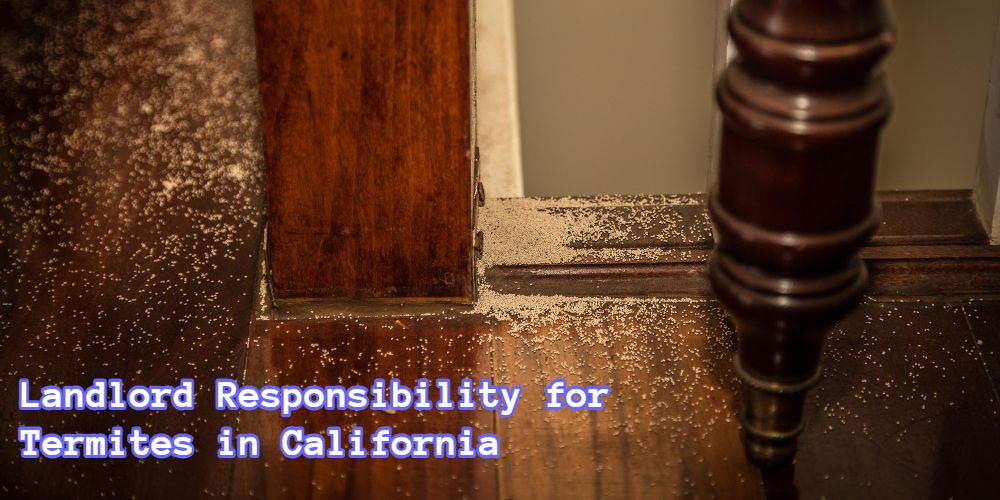Last Updated on December 1, 2023 by Kelvin Nielsen
Is your California home infested with termites and are looking to learn what responsibilities your landlord has? If so, this blog has you covered!
Having your home infested with pests, such as termites or cockroaches, can be incredibly stressful. Pests are irritating, dirty and unwanted creatures that can make your life as a tenant miserable. Luckily for you, California law grants you a smorgasbord of rights.
So, what exactly should you do when your California home is invaded by pests, and specifically termites? Well, here’s everything you need to know in that regard.
Who between landlord and tenant is responsible for pest-control in your California home?
Landlords are, generally speaking!
Whether you’re dealing with a few termites or a swarm of them, your landlord has a responsibility to fix the issue. So, once you notice some termites, get in touch with your landlord as soon as you can.
Please note, however, that the problem may be yours to fix if the infestation arose from your negligence or carelessness.
Related Post: Free Legal Advice for Tenants in California: Know Your Rights
Can termites make your home uninhabitable?
Sure! If the infestation by termites is severe enough and you aren’t the cause of the problem, then your landlord may even need to relocate you as they sort out the issue.
When you rent out a home in California, it’s implied that the home will be habitable. According to Civil Code 1941.1, your landlord has a responsibility to ensure that the home meets all health, safety and building codes.
Also, they must fix any issues that may keep the space unlivable once a tenant starts living there.
What damage can termites cause to your California home?
A termite infestation can be terrifying! It doesn’t take long for these ruinous creatures to chew through structural beams and cause extensive damage. The following is the potential damage termites can cause to your home.
- Damage to wood on the inside of your home. They will eat away at the wood furniture and other elements inside your home.
- Damage to wood around your windows and doors. This can include the wood under your home, the wood inside your walls, and inside the attic.
- Damage to the structural wood of your home. Certain types of termites require moisture to survive. A good example is the subterranean termite. These can enter your home from the ground up, usually through your home’s foundation.
What are the telltale signs of termite damage in your CA home?
When signs of termite damage surface, chances are the infestation is at an advanced stage and extensive damage has already taken place. The following are signs of termites in your California home.
- Mud tunnels on foundation.
- Maze-like designs in wood structures.
- Buckling walls and ceilings.
- Painted walls that peel and bubble.
- A hollow sound made by tapping on wood with a heavy object.
Is your landlord obligated to find you alternative accommodation?
Yes! If the unit becomes unlivable, your landlord has an obligation to find alternative accommodation for you or compensate you. The law, however, doesn’t stipulate the specific amount you should be allocated.
The California Health and Safety Code Section 17980.7(d) only requires landlords to provide their tenants with relocation benefits. The following are common compensation methods landlords in California use.
- Prorating the rent amount for the month.
- Diving the monthly rent by the number of days in that month and compensating the tenant for the number of days they will be relocated.
- Putting tenants up in modest hotels for the entire duration the treatment will take place.
You may also ask your landlord to compensate you for food costs as well if you’re not able to prepare meals in a hotel.
Are there instances where the tenant may become responsible for termite infestation?
An insect infestation doesn’t always fall on the shoulders of a landlord. If you create living conditions that draw in termites, then you may become liable for fixing the issue.
Your landlord may even have grounds to issue you a comply or quit notice to make certain that you’ll fix the issue.
Can a landlord refuse to fix a termite infestation in your home?
Once you contact your landlord, they must act within a reasonable period of time. Ideally, if the infestation is severe enough, they must reply you within a day. If they ignore your repeated requests, the California landlord-tenant act provides you several options.
One option you may pursue is to report the landlord to the local health and building officials. They will issue the landlord with a citation and motive them to take action immediately.
Another option you have is to withhold further rent payments until the landlord fixes the issue. Under (Civil Code § 1941.1 and § 1941.3), landlords have a responsibility to maintain habitable premises. And if they don’t, tenants have a right to withhold rent or “Repair and Deduct.”
And lastly, you have the option to move out. According to California Civil Code 1942, tenants may be able to terminate their lease once their rented premises become uninhabitable.
What are your obligations in controlling a termite infestation in your California home?
Of course, prevention is better than cure. The following are some steps you can take to keep your home termite-free.
- Keep humidity levels low.
- Let in as much light as you can.
- Get rid of excess moisture.
- Ensure your landlord conducts regular maintenance checks to spot early signs of infestations.
- Ensure you have good airflow within your apartment.
- Ensure that leaks are fixed promptly.
Conclusion
Once you notice a termite infestation in your home, notify your landlord as soon as you can. Depending on the severity of the infestation, your landlord may need to relocate you temporarily and compensate you for some costs.
On the other hand, however, you may be liable if the infestation can be linked to your careless actions or behavior. Follow the aforementioned tips to keep your home termite-free.
Disclosure: The content herein isn’t a substitute for advice from a professional attorney. It’s only meant to serve educational purposes. If you have a specific question, kindly seek expert attorney services.
Sources: California Code, Civil Code – CIV § 1940.8.5, California law (CA Civil Code 1940-1954.05), CA Civ. Code § 1941.2, CA Civil Code 1940-1954.06, https://www.pestworld.org/

Hi, I’m Kelvin Nielsen, an experienced landlord and accomplished real estate lawyer. My focus is on answering your questions about renting in the hopes of making your life as a renter or a landlord a bit easier.







